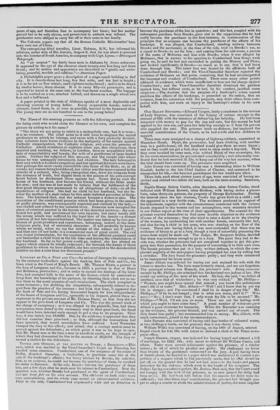LONGMAN AD CO. V. POLE AND Co.—An action of damages
for conspiracy, by the eminent booksellers against the banking firm of Pole and Co., has been tried in the Court of King's Bench. Mr. Thomas Hurst, a partner in the firm of Longman and Co., became in 1825 a partner in that of Hurst and Robinson, printscllers ; and in order to sustain the dealings of the latter firm, had accepted bills in the name of the former, which he contrived to keep from the knowledge of his partners, by directing their clerk not to no- tice them in the usual accounts of such transactions. The clerk complied in some instances ; but disliking the irregularity, subsequently refused to de- part from the practice of the concern : and from that time, it appeared that the bank of Pole and Co. having discounted largely for him independently of the house of Longman and Co., agreeably to his request, placed these ac- ceptances to the private account of Mr. Thomas Hurst, so that they did not appear in the pass-book of Longman and Co. This was the ground work of the charge of conspiracy ; as it was alleged by the plaintiffs, that, had these acceptances been stated in the customary way in their pass-book, the fraud would have been detected early enough to put a stop to its progress. Their loss, it was stated, was 19,000/. But, by the evidence, it appeared that they did not examine their pass-book ; so that, although the transactions had been inserted, they would, nevertheless have suffered. Lord Tenterden charged the Jury to this effect; and added, that a corrupt motive must be proved against the defendants; on which point it was to be kept in view, that Mr. Hurst was at the time a man in excellent credit, on the strength of which they had discounted for him to the amount of 60,000/. The Jury re- turned a verdict for the defendants.
TIPPER AND OTHERS, IN THE MATTER OF DOLBY, A BANKRUPT—This case, which was decided in the Vice-Chancellor's Court on Thursday, has excited some attention. Cumberland, one of the assignees of the estate of Dolby, directed Smeeton, a bookseller, to purchase some lots at the sale of the bankrupt's effects ; but being advised by Brooks, his solicitor, that, as an assignee, he could not become the purchaser of them, he revoked his order to Smeeton. At the sale, Brooks became the purchaser of these lots, and a few days after he made over his interest to Cumberland. Now the question was, whether Brooks had purchased as the agent of Cumberland, and not Luna fide on his own account. The affidavits on both sides were very contradictory, and the whole case rested on circumstantial evidence. Prior to the sale, Cumberland had expressed a wish and an intention to become the purchaser of the lots in question ; and this fact, coupled with his subsequent purchase from Brooks, gave rise to the supposition that he had really become the purchaser in the first instance, in contravention of the principle that no assignee can become the purchaser of the effects of his bankrupt. It was alleged, that Cumberland, standing midway between Brooks and the auctioneer' at the time of the sale, trod on Brooks's toe, as a signal to Brooks to act for him : and coming from the sale-room, a person of the name. of Molineux met him with Brooks, when it was alleged by Molineux, that in answer to his question to Cumberland how things were going on, he said he had just succeeded in getting the History. and Plays, and looked significantly at Brooks—as much as to say, that it had been done through him. This latter fact was denied by the affidavits both of Cumberland and Brooks ; and the Vice-Chancellor therefore rejected the evidence of IVIolineux on that point, conceiving that he had misinterpreted the language and conduct of Cumberland. There were many other points adduced in evidence, which were insufficient to bear out the charge against Cumberland; and the Vice-Chancellor therefore dismissed the petition against him, but without costs, as he had, by his conduct, justified some suspicion.—The doctrine that the assignee of a bankrupt's estate cannot purchase the effects of the bankrupt, is grounded on the notion that an assignee, from his connexion with the property, may deter others from com- peting with him, and work an injury to the bankrupt's estate in his own behalf.


















 Previous page
Previous page